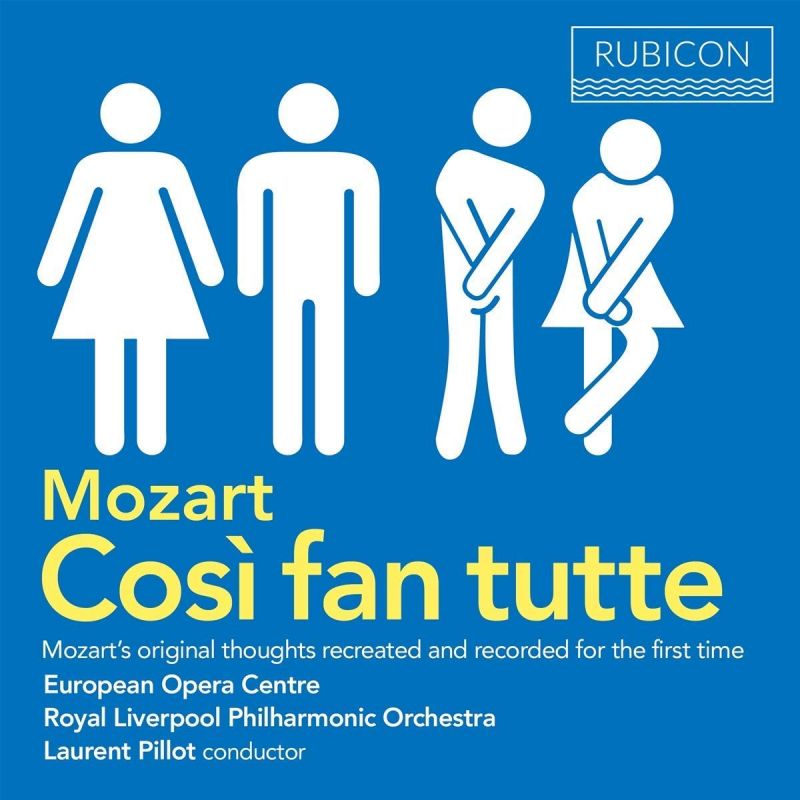MOZART Così fan tutte (Pillot)
View record and artist detailsRecord and Artist Details
Composer or Director: Wolfgang Amadeus Mozart
Genre:
Opera
Label: Rubicon
Magazine Review Date: 02/2019
Media Format: CD or Download
Media Runtime: 148
Mastering:
DDD
Catalogue Number: RCD1026

Tracks:
| Composition | Artist Credit |
|---|---|
| Così fan tutte |
Wolfgang Amadeus Mozart, Composer
Alexander Sprague, Ferrando, Tenor Biagio Pizzuti, Guglielmo, Baritone Daniela Candillari, Fortepiano Francesco Vultaggio, Don Alfonso, Baritone Hamida Kristoffersen, Despina, Soprano Héloise Mas, Dorabella, Mezzo soprano Laurent Pillot, Conductor Nazan Fikret, Fiordiligi, Soprano Royal Liverpool Philharmonic Orchestra Wolfgang Amadeus Mozart, Composer |
Author: Tim Ashley
In practice, this means leaving Act 1 largely unaltered apart from some verbal tweaking, though Guglielmo is given his alternative aria ‘Rivolgete a me lo sguardo’ instead of his more familiar ‘Non siate ritrosi’. Considerable adjustment is required, however, to bring Act 2 into line with Woodfield’s findings. Since the sexual rivalry that develops between the two men is now less in evidence, Ferrando loses ‘Tradito, schernito’, while Guglielmo’s bitter ‘Donne mie, la fate a tanti’ is both reallocated to Don Alfonso and relocated earlier in the act. Dorabella’s ‘È amore un ladroncello’ has been cut, as, more questionably, has Despina’s ‘Una donna a quindici anni’. Even more detrimental, however, is the decision to give the work without choruses for reasons that remain unclear: we consequently lose both ‘Bella vita militar’ and the Act 2 Serenade, while the excisions in the Act 2 finale come dangerously close to pulling the whole scene out of shape.
The performance itself is excellent. Laurent Pillot conducts with superb energy and grace, and there’s some elegant playing from the Royal Liverpool Philharmonic, whose woodwind sound particularly lovely here. The student ensemble cast is similarly strong, though Alexander Sprague’s introverted Ferrando has some effortful moments in his upper registers. Nazan Fikret’s silver-toned Fiordiligi and Héloïse Mas’s altogether more sensual Dorabella sound good together in their duets, and Fikret’s ‘Come scoglio’ is technically secure and most beautifully done. Francesco Vultaggio makes a brusque Don Alfonso opposite Hamida Kristoffersen’s ironic, worldly wise Despina. Best of all, perhaps, is Biagio Pizzuti’s Guglielmo, his voice warm and mature, his characterisation wonderfully subtle: he’s as good as, if not better than, many big-name singers who have recorded the role.
It leaves you with mixed feelings, however. Woodfield’s musicological findings are persuasive, and unquestionably shed new light on Così’s genesis. And it is, of course, fascinating to hear the work as it may originally have been planned. Leaving the seductions uncrossed, however, inevitably means that we lose much of the sadness, irony and psychological perception that make the standard score such a complex and troubling experience. Anyone who cares about Così should hear this. But in the final analysis, it reminds us that it was Mozart and da Ponte’s eventual revisions that resulted in the masterpiece that affects us so deeply today.
Discover the world's largest classical music catalogue with Presto Music.

Gramophone Digital Club
- Digital Edition
- Digital Archive
- Reviews Database
- Full website access
From £8.75 / month
Subscribe
Gramophone Full Club
- Print Edition
- Digital Edition
- Digital Archive
- Reviews Database
- Full website access
From £11.00 / month
Subscribe
If you are a library, university or other organisation that would be interested in an institutional subscription to Gramophone please click here for further information.




